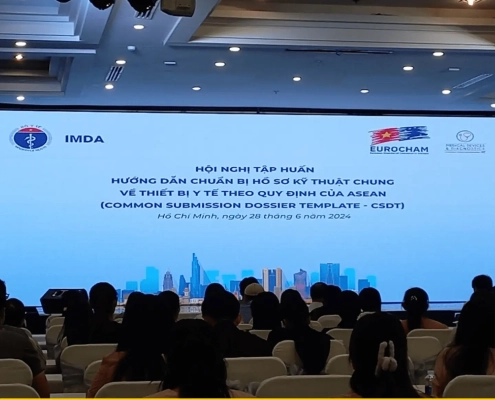Come grow with us in the US in Thailand in China in Korea in the Philippines in Taiwan in Hong Kong
Medical Device Advertising Approval Requirements in Asia
Covers Medical Devices Advertisement Requirements in Thailand, Philippines, Indonesia, Vietnam, Malaysia, Singapore, Korea, China, Hong Kong, Taiwan, and Japan.
Published on: July 25th, 2022
Updated on: August 24th, 2023
Advertising Approval Could Require Up to 3 Months in Some Markets
In addition to receiving market authorization for the safety and efficacy of their product, manufacturers wishing to advertise their medical devices, especially Direct to Consumer (DTC), may need to also obtain approval for their marketing material. Advertising medical devices in Asia has become more regulated the last few years as government authorities enforce additional oversight on manufacturers’ claims and the language used in their marketing collateral.
While most authorities will only require manufacturers submit marketing material when making specific claims, other authorities will want to see examples of material, such as videos or ads, as part of the review process. It’s also important for manufacturers to remember that even in markets where a formal application process isn’t in place, it’s still crucial that the advertising materials accurately represent the approved claims and intended uses.
Introduction to Medical Device Advertising Requirements in Asia
Medical device manufacturers planning to advertise in Asia will need to comply with local regulations. Compliance will vary by country as well as the advertisements’ target audience. While some countries will require all materials be reviewed prior to use, some markets will only reqire Direct to Consumer (DTC) advertisements be reviewed while exempting those targeted at Healthcare Professionals (HCPs). Lastly, some markets, like Singapore, won’t require advertisements be reviewed but will hold manufacturers and advertisers accountable if their ads to not meet their standards (i.e. not misleading, off-label, etc.). We’ve included a brief summary table below for easy reference while more information can be found further down the article.
| Requirements | Time | Labeling | |
| India | Ads must abide by general ethical principles | N/A | N/A |
| Thailand | DTC is reviewed, HCP is submitted on online portal | DTC is 1-2 months; HCP is immediate | Legal language and registration number required on ads |
| Vietnam | All advertisements must be uploaded to Portal | Legal language and registration number required on ads | |
| Indonesia | DTC must be reviewed and HCP ads are not permitted | 30 days | Legal language and registration number required on ads |
| Malaysia | DTC advertisements must be reviewed. | 30 days | Legal language and registration number required on ads |
| Singapore | Ads must abide by general ethical principles | N/A | N/A |
| Philippines | All ads are reviewed by Ad Council and the PFDA | 30 days | Legal language and registration number required on ads |
| China | All ads must be reviewed | 10-30 days | Legal language and registration number required on ads |
| Taiwan | All ads must be reviewed | 10-30 days | Legal language and registration number required on ads |
| Hong Kong | Ads must abide by general ethical principles | N/A | N/A |
| Korea | DTC advertisements should be reviewed. | 30 days | Legal language and registration number required on ads |
| Japan | Ads must abide by general ethical principles | N/A | N/A |
India
Indian regulations are currently lagging behind times in terms of laws and clear guidance on the type and extent of social media promotion allowed for medical devices. This being said, all devices regulated with an Import License Approval via Form MD-15 of the Medical Device Rules, 2017, carry the following text in the cover letter: Any literature or packing accompanying the Medical Devices or any matter stated on the label should not contravene the provisions of the Drugs and Magic Remedies (Objectionable Advertisement) Act.
In the Medical Device Rules, 2017 and Drugs and Cosmetics Rules, 1945, under the Drugs and Cosmetics Act 1940, there are no specific provisions/sub-rules pertaining to Advertising and Promotion of Medical Devices. The current, existing “Drugs and Magic Remedies (Objectionable Advertisement) Act, 1954” which is in the process of being re-established as the — Draft Drugs and Magic Remedies (Objectionable Advertisements) Amendment Bill 2020, was released on February 3, 2020.
The amendment increases the scope of the word “advertisement” by including electronic media, internet or websites as well as notices, circulars, labels, wrappers, invoices, banners, and posters. With this revised scope, promotion of medical devices by social media is also being covered.
Additionally, the Department of Pharmaceuticals under the Ministry of Chemicals and Fertilizers has issued a draft of the Uniform Code for Medical Devices Marketing Practices (UCMDMP). This draft is under discussion with the industry associations and is a voluntary code and not a statutory code and therefore not enforced by law.
Thailand
As of November 2020, only manufacturers advertising directly to consumers will require prior approval from the TFDA. For Direct to Consumer, or DTC, the TFDA will want to see all advertising material, including print, internet, or video as part of the review process per Notification B.E. 2553 (2010). Applications are closely examined for unapproved language and typically require about 30 days and US $30 to review. Once approved, the licenses are valid for up to 3 years.
Advertising material targeting only Healthcare Practitioners (HCPs) do not need to be reviewed but do need to be uploaded to a public portal.
Marketing material that do not make specific claims such as descriptions of the product’s indications, benefits, quality, standard, or any components of the origin of the device, per Volume 137, Section 260, advertising approval is not required. Furthermore, advertisements that only use the trade or brand name and generic messaging are exempt from seeking permission prior to utilizing the marketing material.
Advertising Regulations – Primary Guidance (Thai Only)
Additional Advertising Regulation – Diseases and conditions prohibited from Ad
Vietnam
Per Article 62 of Decree 98/2021 and implemented in July of 2022, ALL advertising material (e.g., print, internet, or video), including materials for Direct to Consumer (DTC) and healthcare professionals must be uploaded to the public portal. Once uploaded, a unique number is provided which then needs to be included in the advertising materials when placed on the market. Under this new plan, advertisements may be removed from the market if they’re found to not meet the MOH’s requirements. There is no fee for uploading materials to the portal.
Advertising materials must contain the following information:
- Name of medical equipment, type, product code, manufacturer, manufacturing country;
- Circulation number;
- feature, the effect;
- Name and address of the license holder of the free-sale registration number or the organization authorized by the holder of the free-sale registration number of the medical equipment;
- Warnings related to users’ health and storage conditions (if any).
Exceptions
Materials meeting any of the following descriptions do not need to be uploaded to the public portal.
- Do not refer to the medical device name;
- Only list names and technical specifications of medical equipment but have no information on features and effects;
- Scientific research papers;
- Clinical documentation;
- Training materials supporting product manuals.
Indonesia
Indonesia’s advertising approval process is overseen by the Directorate of Assessment of Medical Devices and PKRT, while the supervision of advertisements is carried out by the Directorate of Supervision of Medical Devices and PKRT, Ministry of Health (MOH). Advertising approval is limited to products sold directly to end consumers that fit the following criteria. The process requires less than 30 days, the product must already be registered, and comes with a fee of IDR 1,000,000 (US$70).
Products Requiring Advertising Approval in Indonesia
The product can be used by the community itself public (without the help of professionals) and does not require special skills i.e blood pressure meters , weight scales, pads for women, toothbrush, contact lens, contact lens cleaner, wound dressings, adult diapers, thermometers, condoms, lubricants, breast pumps, and teethers. The product also cannot not pose a high risk of consequences if used incorrectly i.e massage chairs and heating pads. The product does not pose a high risk of consequences from misinterpretation of the results i.e. pregnancy test strips and rapid blood sugar meters.
Advertisements targeted to healthcare professionals are prohibited and therefore do not require approval unless the product is used by the consumer with assistance from the healthcare professional. MOH issued guidance can be found here along with a Google translated version here.
Malaysia
The Malaysia Device Authority (MDA) requires all registered medical devices who sell Direct to Consumer (DTC) submit advertisement applications for their approval. Manufacturers can assign the responsibility for medical device advertisement to an authorized representative which includes advertisers consisting of a private individual or any third party. Each advertisement will need to include the statement, “Registered under Act 737” and the medical device’s registration number.
Advertisements using other languages besides Bahasa Malaysia and English, will require a translated version. Translated versions will need to be endorsed by a body recognized by Authority, such as Malaysian Institute of Translation and Books (ITBM) and Malaysian Translators Association. Any change in the content of advertisements requires for a new application for approval.
More information can be found in the MDA’s 2019 presentation and in Section 4 and 5 of MDA/GD0032 “Advertisement for Medical Devices Requirements.”
The following advertising materials do not require approval prior to using:
- materials such as catalogues or pamphlets that only contain product pictorial representation, brand and/or company name and/or logo that do not consist of any product claims; and
- materials which only contain exact replica of the packaging (not size but shape and content) approved by the Authority.
- All medical device advertisements aimed at:
- Personnel that are directly involved in procurement, or administration in a healthcare facility; and
- Healthcare professionals
Singapore
The Singapore authorities do not have a formal review process for advertisements and instead rely on manufacturer’s complying with the requirements stated in the HPA and the Regulations DTC marketing materials. Advertising for “Professional use only” devices is not allowed unless the advertisement is distributed only to, or contained in, a publication intended to be circulated to qualified practitioners. Therefore, professional use products cannot be advertised on social media or other public mediums.
As for advertisements pertaining to DTC, the HSA does not require a formal application but does require manufacturers “ensure compliance with legislation and guidelines for advertisements and promotions of medical devices.” Furthermore, advertisements must be truthful, not exaggerate or misleading, Additional information on the General Principles of this requirements is detailed below.
Philippines
Medical device advertisements in the Philippines will need to be reviewed prior to being placed in the marketplace. Advertisements are reviewed by the Ad Standards Council and/or the Philippines FDA depending on the content. Non-medical devices will need to submit through the Ad Standards Council (ASC) and their requirements can be found here. The Ad Standards Council is the advertising industry body in charge of screening and regulating content of advertising materials across all mediums and more information can be found here.
Advertising materials containing medical device specific information such as claims and intended uses will also be reviewed by the PFDA before the license is issued. Review time typically required 30 days.
On the other hand, advertisements that provide customers with promotions or incentives will need to obtain a Sales Promo Permit from the Philippines FDA prior to using it. New promo permit applications require about 1 month and will cost between PHP 5,000 and 10,000 while amendments will cost PHP310.
“Sales Promotion” means techniques intended for broad consumer participation which contain promises of gain such as prizes, in cash or in kind, as reward for the purchase of a product, security, service or winning in contest, game, tournament and other similar competitions which involve determination of winners, and which utilize mass media or other widespread media of information. It also means techniques purely intended to increase the sales, patronage and/or good will of a product.“
China
In China, an additional application process for advertisements is required for all medical devices. The provincial level of the China FDA is responsible for the medical device advertisement application review and approval. The document requirements for applicatoins can vary by provincial FDA. For import medical devices, the application should submitted to the provincial level FDA where the China Legal Agent is located and for Chinese domestic medical devices, the application should be submitted to the provincial FDA where the legal manufacturer is located.
Order of the State Administration for Market Regulation (No. 21): Interim Measures for the Administration of the Review and Administration of Advertisements for Medicines, Medical Devices, Health Foods, and Formulas for Special Medical Purposes can be found here.
This regulation came into force since March 1, 2020.
UPDATE: In the summer of 2023, the State Administration for Market Regulation (SAMR) released new draft standards and processes for the regulation of all medical device advertisements in China. More information on the new guidance can be found here and it’s expected to be formally implemented in 2024.
Taiwan
Medical device advertising requirements are regulated by the Medical Device Act, under Chapter V: Management of Medical Device Advertisements. The process will require about 3-4 weeks from submission and incurs a fee of NT$10,000 (US$340) for the initial application. Once approved the licenses are valid for 3 years and will require a fee of NT$5,000 (US$170) to renew the license.
All medical device advertisements must include the Chinese Medical Device Name / Medical Device License Number / License Holder Name / Ad No. XXXXXXXX
Professional-Use Only: Per Article 44, medical devices intended for medical professionals should only be published in medical publications, media, or other mediums that are only for medical professionals. Therefore, social media posts that are available to all citizens are not permitted for medical devices only intended for use by healthcare professionals.
More information on the process can be found in our dedicated blog on the topic here.
Hong Kong
The Medical Device Division of Hong Kong has not implemented any advertising restrictions for medical devices. Furthermore, registration of medical devices in Hong Kong is currently voluntary but will be needed for public tenders. This being said, authorities could take action should there be egregious disregard for accuracy and truth.
There are no specific regulations / guidance as to the social media promotion of medical devices.
For more information, please refer to section 4.4.11 of the MDD issued document GN-01 on the responsibilities in respect of advertisements of listed medical device.
4.4.11 Responsibilities in respect of advertisements
4.4.11.1 The advertisements or other commercial promotional materials shall not contravene the Undesirable Medical Advertisement Ordinance (Cap. 231). https://www.elegislation.gov.hk/hk/cap231
4.4.11.2 The MDD disapproves of references of all kind, in advertisements of medical devices or other commercial promotional materials, to the MDACS, except if the references fall within the permissible exceptions in 4.4.11.3 below. In particular, the MDD disapproves of any representation that the Government has endorsed the safety, quality, efficacy, or effectiveness of a listed medical device. Such representation may be considered as an unjustified claim for the purpose of clause 5.11(d). The LRP must not publish or cause to be published any advertisement or promotional materials that make references to the MDACS except if the references fall within 4.4.11.3 below.
4.4.11.3 Notwithstanding 4.4.11.2, references to the MDACS in lawful advertisements or promotional materials will not be disapproved by the MDD if they are limited to the following forms and if the presentation of these together with other 9 / 20 GN-01:2021(E) information in the advertisements or promotional materials is in a legitimately balanced manner:
(a) a statement to the effect that a certain medical device is listed with the MDD;
(b) mention of the listing number of a listed medical device;
(c) pictures or photographs showing a listed device and/or its packaging, and incidentally, its listing number.
Korea
The previous advertisement regulation was abolished on August 12, 2021 as it was ruled out to be in violation of “Freedom of Expression” that is stipulated in the constitution. The new requirements are now outlined in the amended Medical Device Act and went into effect on June 24, 2021.
Additionally, manufacturers advertising directly to healthcare professionals do not require a review of their materials while advertisements for Direct to Consumer (DTC) products will need a license which requires a fee.
Once approved, the advertisements are given a validity period of 3 years and entities wishing to continue using the materials beyond the validity period will need to seek a renewal 6 months before the expiration date.
Voluntary Review Organizations
Entities who wish to advertise their medical devices in Korea will need to follow Article 25 (Voluntary Review of Advertisement) of the amended Medical Device Act. Per Article 25, manufacturers will need to work with an organization, referred to as a “voluntary review organization” that is overseen by the Minister of Food and Drug Safety (MFDS).
Though technically voluntary, it is recommended that manufacturers seek prior approval for statements not explicitly included on their license to ensure there are no legal ramifications later on.
The following types of advertisements are supported by the voluntary review organizations:
- Television broadcasting and radio broadcasting during broadcasting under Article 2, Item 1 of the Broadcasting Act;
- General daily newspapers and general weekly newspapers among newspapers under subparagraph 1 of Article 2 of the Act on the Promotion of Newspapers, etc., Internet newspapers under subparagraph 2 of the same Article, and Article 2 subparagraph 1 of the Act on the Promotion of Periodicals neck magazine
- Marking on banners, posters, flyers, and transportation facilities and means of outdoor advertisements under subparagraph 1 of Article 2 of the Act on the Management of Outdoor Advertising Materials, etc. and Promotion of Outdoor Advertising Industry (including advertisements displayed on the inside of the means of transportation or consisting of images, audio, sound, and combinations thereof);
- Electric billboard
- Internet media prescribed by Presidential Decree [including applications used in mobile communication terminal devices]
- Other advertising media prescribed by Presidential Decree in consideration of the nature, influence, etc. of the media.
Advertisements meeting the following criteria do not require the review of a volunatary review organization:
- An advertisement consisting only of the content reported or approved under Article 6 (2) or 15 (2);
- Foreign language advertisements for medical devices produced exclusively for export
- Advertisements in the same foreign language as those subject to deliberation pursuant to paragraph (1);
- Advertising with content prescribed by Presidential Decree, such as advertisements targeting a group of experts, such as medical personnel.
Restrictions
Per Article 24 (Prohibition of Description and Advertisement, etc.) of the amended Medical Device Act, the following items should not be indicated or written on the container, exterior, packaging, or attached document of a medical device:
- Matters likely to be false or misunderstood
- Performance, efficacy and effect different from those reported or not obtained permission or certification under Article 6 (2) or 15 (2);
- A method of use or period of use that may cause harm to health and hygiene
Additionally, no one shall make advertisements falling under any of the following subparagraphs in relation to advertisements for medical devices.
- False or exaggerated advertisements regarding the name, manufacturing method, performance, efficacy and effect of a medical device, or its principle;
- Articles that a doctor, dentist, oriental medical doctor, veterinarian or other person guarantees, recommends, certifies, guides, or acknowledges the performance, efficacy and effectiveness of medical devices, or that may be misunderstood as using such medical devices; ad used
- Advertisements that use articles, photos, or designs suggesting the performance, efficacy, and effects of medical devices, or using other implied methods;
- Advertisements that suggest abortion or use obscene documents or designs about medical devices
- Advertisements regarding the name, manufacturing method, performance, efficacy, and effect of medical devices that have not obtained permission or certification under Article 6 (2) or 15 (2) or are different from those reported. However, in the case of medical devices falling under the proviso to Article 26 (1), advertisements may be made in accordance with the procedures, methods, and permitted ranges determined and publicly notified by the Minister of Food and Drug Safety.
- Advertisements that have not been subject to voluntary deliberation under Article 25 (1) or advertisements with content different from those reviewed.
Japan
Medical device advertisements do not need to be approved before using in Japan but do need to abide by rules or penalties could be administered. Advertising guidance and rules can be found in the Pharmaceutical Affairs Act and the Advertisement Adequacy Standards and Promotion Code. Advertising requirements for medical devices follow the same rules as medicinal substances.
Some general principles include those outlined in Article 66 and 68 of the Pharmaceutical Act and include:
- Medical devicess intended for healthcare professionals only and could cause harm if used by the general public can not advertise to the general public.
- Advertisements should not mislead.
- “Off-label” marketing is not permitted.
- Manufacturers can not advertise unapproved products.
Entities that are found in breach of the established rules and guidelines could be punished with up to 2 years of imprisonement or a fine of no more than JPY 2,000,000.
Come Grow With Us
Please contact us if you’re interested in marketing your medical devices in Asia and/or have questions about advertising requirements. Asia Actual specializes in helping medical device manufacturers grow their sales in Asia with experienced, bi-lingual commercial and regulatory experts on the ground in each market. Contact Asia Actual today with any questions or support requests.
Asia Actual is a regulatory consulting company specializing in helping manufacturers grow their sales through independent license holding, direct fulfillment, and a variety of sales channel support services.






